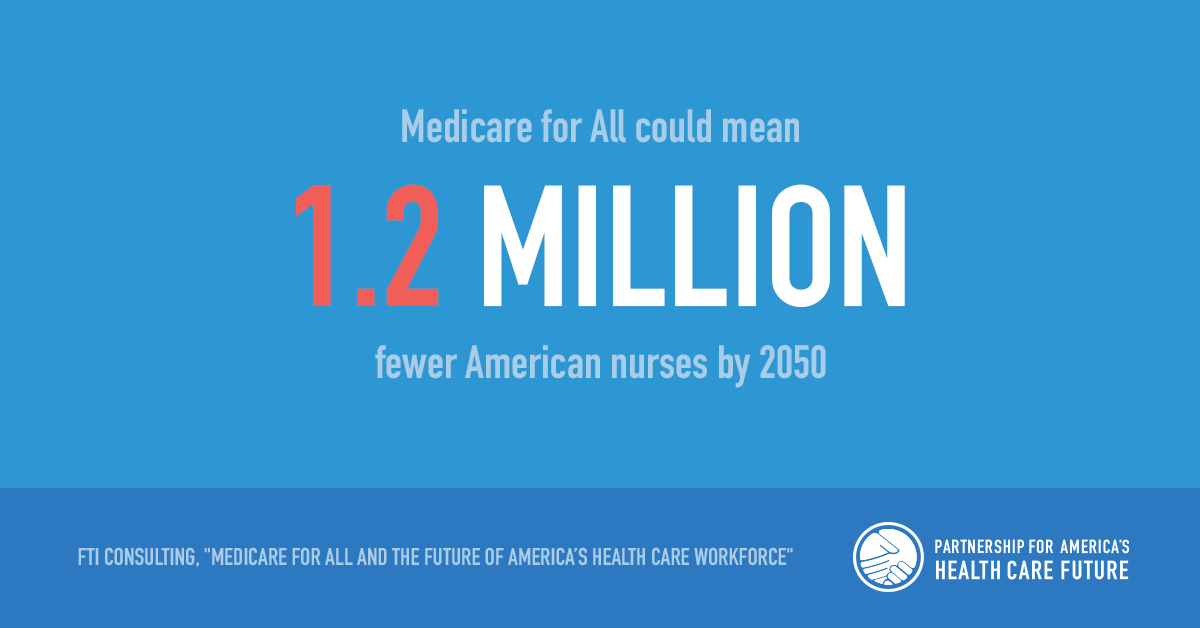New Issue Brief: More Than 1.2 Million Health Care Jobs At Risk Under Medicare For All

1.2 Million Fewer Nurses & 45,000 Fewer Doctors Nationwide Under One-Size-Fits-All System, Threatening Patient Access & Quality Of Care
WASHINGTON – An issue brief released today by FTI Consulting and the Partnership for America’s Health Care Future finds that a one-size-fits-all new government health insurance system known as Medicare for All “could have a significant negative impact on the adequacy of the country’s health care workforce, access to care, and, ultimately, patient outcomes.”
According to the issue brief, “Medicare for All, when fully implemented, could result in a nationwide loss of 44,693 physicians by 2050 relative to current projections.” Under Medicare for All, “the number of registered nurse graduates will decline by more than 25% and the entire nurse workforce will shrink by 1.2 million registered nurses by 2050 relative to current projections,” according to the issue brief.
And access to quality care at our nation’s rural hospitals, serving more than 60 million Americans, could also be limited. The issue brief adds that “Medicare for All would result in an estimated decrease of 5.4% in the total number of U.S. physicians, a reduction that would be felt most acutely in rural communities already experiencing access challenges. Further, research shows that shortages of healthcare workers in rural areas widen existing health disparities and contribute to hospital closures.”
Key Findings:
- Medicare for All, when fully implemented, could result in a nationwide loss of 44,693 physicians by 2050 relative to current projections.
- By 2050, urban and rural areas alike could see a decrease of 5.4 percent in the supply of physicians.
- The impact of Medicare for All on the primary care workforce would be particularly acute, resulting in a loss of 10,286 primary care physicians by 2050.
- Shifting the entire U.S. population to Medicare would result in an estimated 16 percent cut to spending on patient care provided by physicians.
- Medicare for All’s reimbursement cuts would result in 90 percent of hospitals across the country running consistent deficits, increasing the risk of hospital closures nationwide and negatively impacting the healthcare workforce.
- The nursing workforce, already projected to reach shortage levels in seven states by 2030, could see a reduction of 1.2 million nationally by 2050 under Medicare for All.
The issue brief concludes that “the impact of Medicare for All on America’s health care workforce would undermine the policy’s central objective: expanding access to care. With many areas of the country already on the brink of a crisis when it comes to provider shortages, policymakers must consider the impact of Medicare for All and related policies on the ability of these communities to attract and retain the next generation of health professionals. The effects of reduced reimbursements under Medicare for All would directly impact not only health care workers and their patients, but the health of communities across the country as they contend with delayed access to care, decreased quality and widening health disparities.”
“This new issue brief adds to the mounting evidence that Medicare for All would threaten Americans’ access to quality health care,” said Lauren Crawford Shaver, the Partnership’s executive director. “Instead of forcing Americans into a one-size-fits-all government health insurance system controlled by politicians, our elected officials should instead focus on building on what’s working and fixing what isn’t.”
- To read the complete issue brief from FTI Consulting, CLICK HERE.
- To learn more about Medicare for All, CLICK HERE.
- To learn more about the Partnership for America’s Health Care Future, CLICK HERE.
Recently, one of the architects of Medicare for All admitted to POLITICO that in order to pay for the costly new system, “the savings don’t come out of the sky … that means layoffs. There’s just no way around it.”
And the public option and other so-called ‘moderate’ incremental proposals would ultimately lead to the same consequences. The Associated Pressrecently reported that one-size-fits-all new government health insurance systems – including Medicare buy-in and the public option – “would affect thousands of jobs nationwide.”
About FTI Consulting: FTI Consulting, Inc. is a global business advisory firm dedicated to helping organizations manage change, mitigate risk and resolve disputes: financial, legal, operational, political and regulatory, reputational and transactional. With more than 4,700 employees located in 28 countries, FTI Consulting professionals work closely with clients to anticipate, illuminate and overcome complex business challenges and make the most of opportunities. For more information, visit www.fticonsulting.com and connect with us on Twitter (@FTIConsulting), Facebook and LinkedIn.
About the Partnership for America’s Health Care Future: The Partnership for America’s Health Care Future’s (PAHCF) mission is to build on what’s working in health care and fix what’s not. Every American deserves access to affordable health coverage and high-quality care. Our health care system allows tens of millions of patients and families to receive world-class care delivered by world-class doctors and hospitals. But we can and must do more to ensure health care works for all Americans. That’s why the nation’s leading doctors, nurses, clinicians, community hospitals, health insurance providers, and biopharmaceutical companies want to work together to lower costs, protect patient choice, expand access, improve quality and foster innovation. And whether it’s called Medicare for All, Medicare buy-in, or the public option, one-size-fits-all health care will never allow us to achieve those goals. That’s why we support building on the strength of employer-provided health coverage and preserving Medicare, Medicaid, and other proven solutions that hundreds of millions of Americans depend on – to expand access to affordable, high-quality coverage for every American.
###